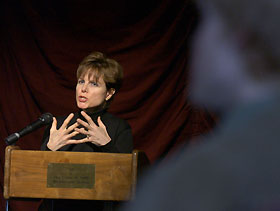|
This is an archived article. For the latest news, go to the Advance Homepage
For more archives, go to the Advance Archive/Search Page. |
||
|
Faculty Teach High Schoolers
When BioBus, the bioscience laboratory on wheels, comes to town, participants from local high schools cram aboard the bus for an experiment that's challenging and fun. But for the visiting scientists who travel with the bus, there's something more: the possibility that the seed they plant will germinate - in this case, into a scientist.
"I entered the biological sciences so that I could teach young people," said Dr. Kristen Zarfos, an assistant professor of surgery at the Health Center and a breast cancer specialist, who was the visiting scientist when the BioBus stopped by Westminster School in Simsbury Feb. 12. "I believe if you teach young people how their bodies work, they'll be better able to take care of themselves." The BioBus is a mobile science learning center outfitted with the latest in bioscience equipment and state-of-the-art computers. The bus is owned by CURE - Connecticut United for Research Excellence - and co-sponsored by UConn. It visits schools around the state in an effort to foster the excitement of scientific discovery among students. The project's long-term goal is to encourage students to pursue scientific careers. Visiting scientists associated with the BioBus specialize in bioscience research. They act both as role models and as scientific experts, validating the "real life" applicability of the experiments on the BioBus, answering questions, and serving as science resources for teachers. "Visiting scientists drive the point home that what we're doing has applications in the real world," said Abby Demars, BioBus staff scientist and coordinator of the program. "They're able to reinforce everything we're teaching. They tell the students how the experiment we're doing applies to their research." Visiting scientists are usually science staff or faculty of one of the sponsoring organizations, such as Bayer, Boehringer Ingelheim, Bristol-Myers Squibb, Fisher Scientific, Pfizer, UConn, or the State University system. Zarfos's Westminster visit differed from the usual visiting scientist program because she was invited by the school to address the whole student body on the science and medicine of breast cancer. On the BioBus, the students conducted experiments in DNA fingerprinting, also known as DNA restriction analysis, which has applications in medicine, research, and forensics. Freshman Erica Briggs of Simsbury said she could relate to the topic. "Everyone needs to know about breast cancer," she said. "My aunt was diagnosed, treated, and recovered. It was good to hear about the research that's being done." Skylar Miers of Guilford, also a freshman, said, "It's interesting to know more about how your body functions. Now we know what to look out for and what we can do to keep ourselves healthy." Zarfos said the students asked great questions. "I highly recommend this to all of my colleagues," she said. "It's engaging to teach young adults to take care of themselves and to explain to them how gratifying a career in medicine, science, or advocacy can be." She said she also appreciated the opportunity "to open their minds to science and medicine and the possibility that they can be the discoverers of an advance that can touch and improve the lives of millions." Several other UConn faculty have been visiting scientists, including Carol Anderson and Steve Jakubielski from Avery Point; Peter Scheifele, of Storrs and Avery Point; and Linda Strausbaugh from the Storrs campus. UConn is well represented on the BioBus staff, too. Demars is a December 2000 graduate who majored in molecular and cell biology, and staff scientist Erin Fiondella graduated with a degree in biology in May 2002. "A visiting scientist should be energetic, charismatic, able to relate well to kids, and also able to deal with constantly changing situations," Demars said. "Most importantly, the visiting scientist should have a strong love of all types of science, and portray science as fun and interesting." To participate in the program, contact Demars at 203.777.8747. |

